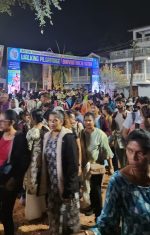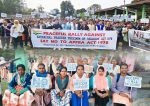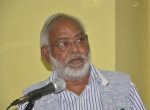By Matters India Reporter
New Delhi, Jan 27, 2020: The year 2019 witnessed at least 328 incidents of targeted violence against Christians in India, including 230 mob attacks and 2 murders, said in its latest “Violence Against Christians in India”, a report by Alliance Defending Freedom (ADF) – India.”
This number is significantly more than in previous years and yet represents only a portion of the violence that is actually being experienced by the community. Several incidents go unreported due to fear of reprisals.
ADF India is a legal firm that deals with religious minority issues, among others.
The victims of these violent attacks included 275 tribals, 55 Dalits, 164 women and 117 children. Out of these, 131 incidents involved dereliction of duty by law enforcement authorities.
Information on these incidents was received on the United Christian Forum helpline number 1-800-208-4545 and through members of the nationwide ADF India allied network.
Only 36 First Information Reports (FIRs) were registered against the perpetrators of violence whereas on 110 occasions Christians were denied permissions to conduct religious functions by authorities under various pretexts.
As in previous years since 2014, the states of Uttar Pradesh and Tamil Nadu were the worst affected, with 73 and 56 incidents of violence respectively followed by 36 in Chhattisgarh, 27 in Karnataka, 23 in Jharkhand, 19 in Andhra Pradesh, 18 in Telangana and 15 in Maharashtra. In all, 20 states and 4 union territories recorded violence against Christians in 2019.
January 2019 began with 31 incidents in 31 days. Even on Republic Day, a peaceful prayer meeting in a house in Kotra, Udaipur, Rajasthan was disrupted by extremist elements who threw stones and shouted slogans against the Christian faith.
As in many other cases, false allegations of forceful conversion were leveled against the Christians by the mob.
In February, 23 incidents of violence against Christians took place. In a gruesome incident, Manglu Nurety, a Christian gospel preacher was shot dead in Kohkameta, Narayanpur, Chhattisgarh. It was claimed by those opposed to his faith that he had been killed by Naxalites who believed him to be a police informer. An FIR was lodged against unknown persons.
As many as 25 incidents were reported in March. A landlord in village Dhanora, Kondagaon, Chhattisgarh was threatened of dire consequences if he continued to allow his tenants to conduct Christian prayers. He was forced to evict the pastors who continue the prayers elsewhere.
April, the month during which Christians fasted and prayed on the occasions of Good Friday and Resurrection Sunday, witnessed the highest number of violent incidents – 34 in 13 states of India.
Nagaraj, Suresh, Manjunath, Dorai and Rajesh, claiming to be members of Hindu Munnani, barged into a Christian prayer in Ooty, Tamil Nadu, and disrupted the worship service.
They warned the congregation against conducting Christian prayers in their village stating that India is a Hindu country! Within a few days, they accompanied municipal officers and 15-20 police officers who forced the Christians out and began demolishing the Church.
When the Christians gathered in large numbers to protest the arbitrary action, the police stopped the demolition but sealed the Church. A petition by the Christians to restore and reopen the Church is pending before the Madras High Court.
May saw 21 incidents of violence against Christians. Christian families in Chirudhi Bundu village, Ranchi were denied access to public amenities because they had embraced Christianity. Jharkhand and Chhattisgarh have been notorious for several such cases of social ostracization, throughout the year.
The month of June witnessed 23 incidents, including a cowardly attack by a gang of 5 Hindutva extremists, who forcefully entered the house of a Pastor in Wangani, Punehtra in his absence and assaulted his two sisters, aged 23 and 20, with firewood. Later, their elderly father too was beaten up.
July was no different. There were 28 incidents of violence against Christians. A Church in Wadanasapuram, Vishakhapatnam was burnt down by religious zealots after several failed demolition attempts. The criminals did not want the Church to exist there since it was situated adjacent to a temple.
Even in August, when India celebrates its Independence Day, the meagre population of 2.3 percent Christians had no respite. Some 31 incidents of violence against Christians were recorded in 31 days.
In one incident, 15 Christian families were forced by members of the Adivasi Mahasabha and the village council at Dantewada, Chhattisgarh to participate in religious rituals that violated their conscience. No FIR was registered in this incident.
September witnessed 29 incidents of violence against Christians, two of which were gruesome.
In Khunti, Jharkhand, three tribal Christians named Kalem Barla, Phagun Kachap and Philip Horo was brutally beaten up on the suspicion that they were planning to slaughter a cow. Philip Horo died on the spot.
In another incident in Jharkhand at St. John’s Berchmans Inter College, a mob of 500 extremists armed with weapons assaulted students. Two boys were seriously injured. Women staff members and students were molested by the mob.
October recorded 28 incidents of violence against Christians. This included one in Nalgonda, Telangana where a mob of 30 forcefully entered the home of a Pastor in Vasalamarry village and disrupted birthday celebrations. They assaulted the people physically and verbally, including the women gathered there, forcing them to chant “Jai Shri Ram”.
Christians suffered 30 incidents of violence in November. In Satarpur, Gujarat, a newly constructed Church in Satarpur, Gujarat was not allowed to be inaugurated by a mob of Hindutva extremists. Instead of protecting the Church and the right of Christians to conduct their prayers, the local police detained the Pastor for “questioning”, without even telling him whether a criminal complaint had been filed against him.
As many as 22 violent attacks on Christians were reported in December. A Pastor in Rayagada, Odisha was stopped by around 15 persons and given life threats when he was returning home after conducting a Sunday worship service in a village. Later that evening, the hut where he had led the Christian worship was set on fire.
“The increase in frequency and viciousness of the attacks against religious minorities in 2019, particularly Christians and Muslims, is a matter of grave concern,” said Tehmina Arora, Director, ADF India.
“No one should be targeted for their faith. Religious extremism is threatening India’s centuries-old culture of pluralism and religious tolerance. State authorities need to ensure that all persons are able to freely practice their faith without fear of mob violence or discrimination, in line with the various guidelines issued by the Supreme Court of India,” she added.










